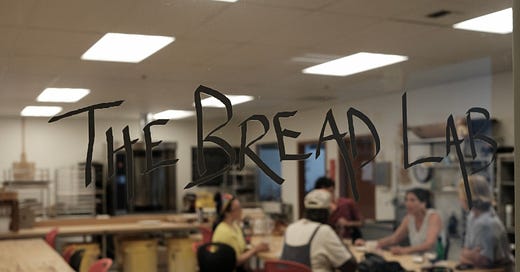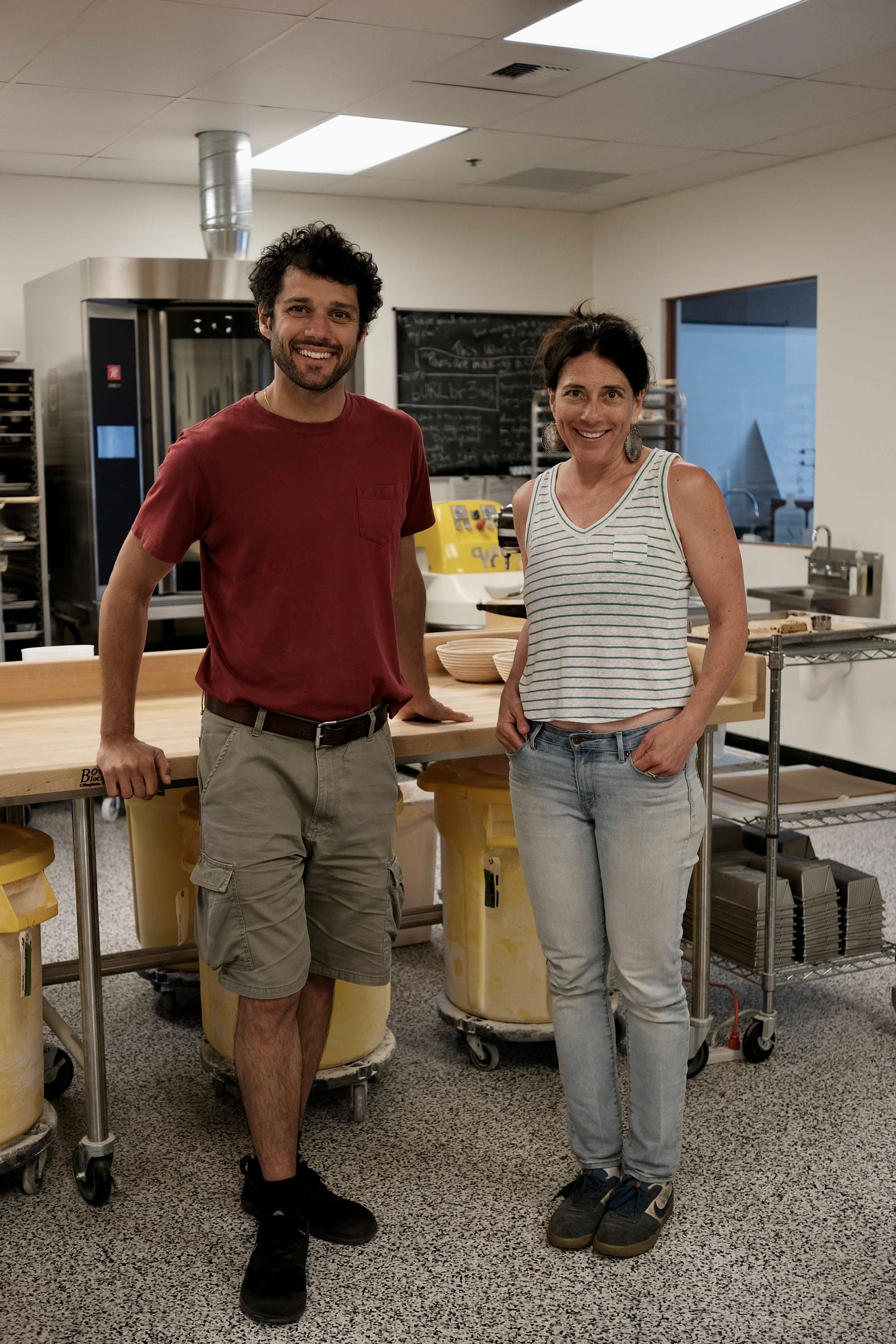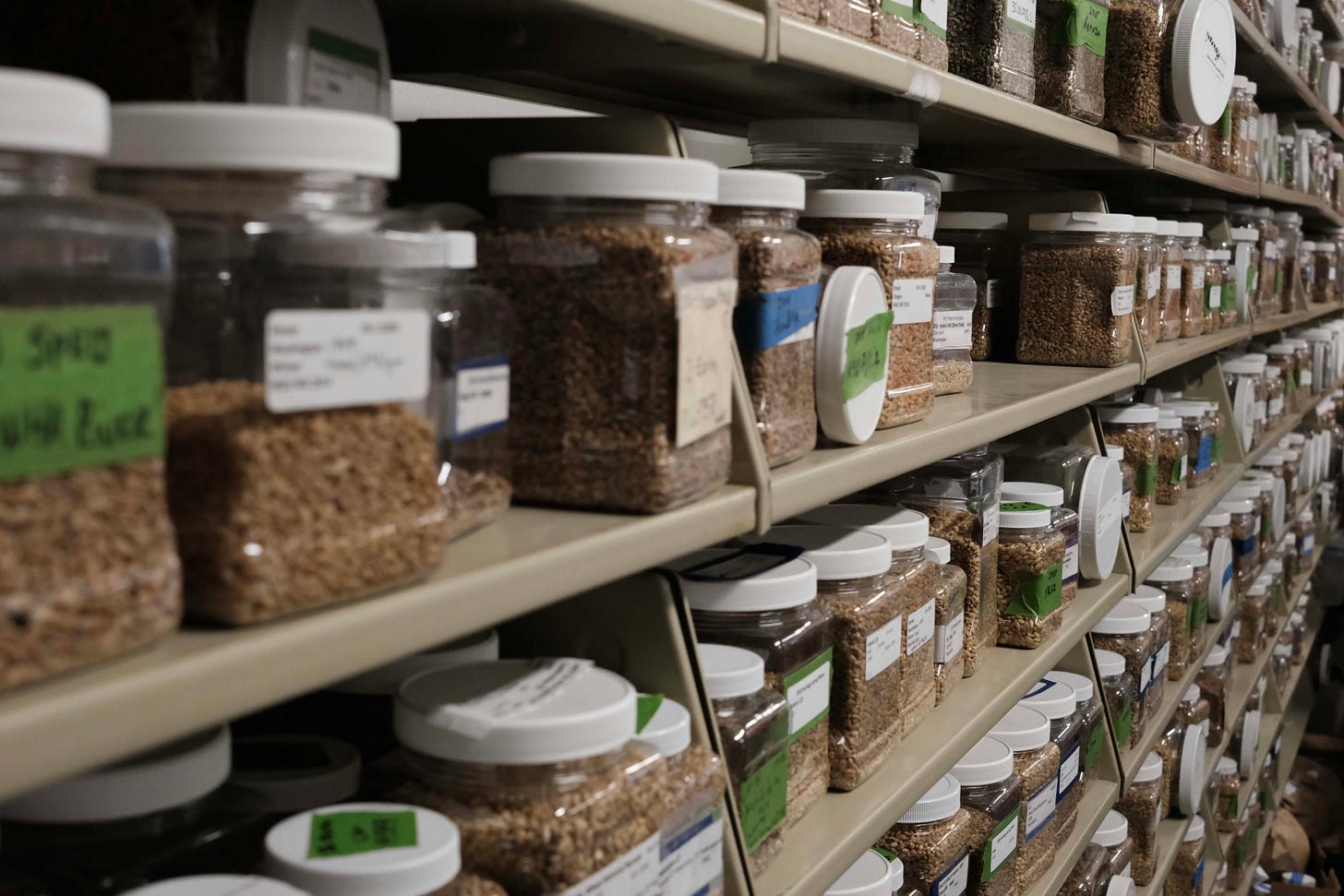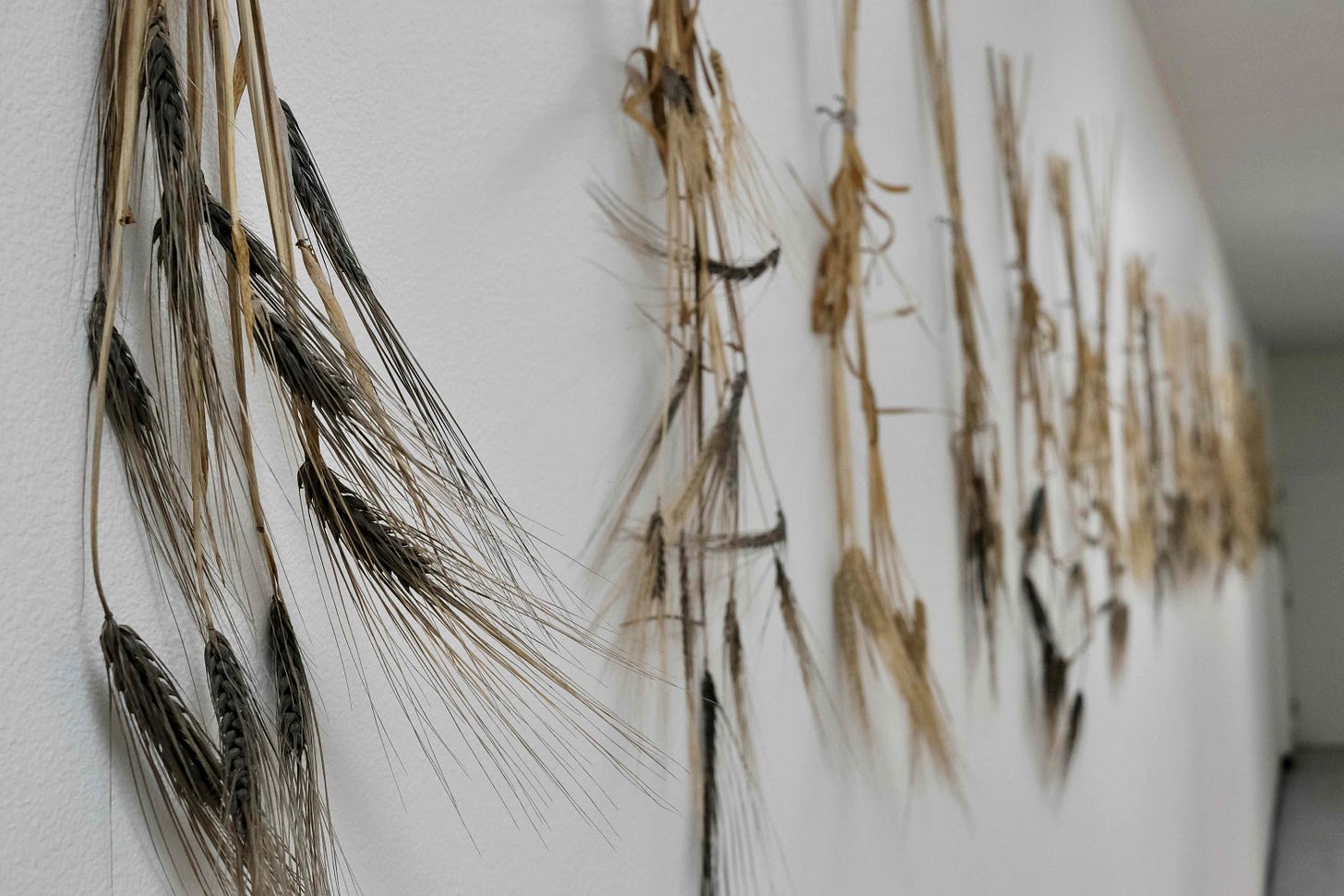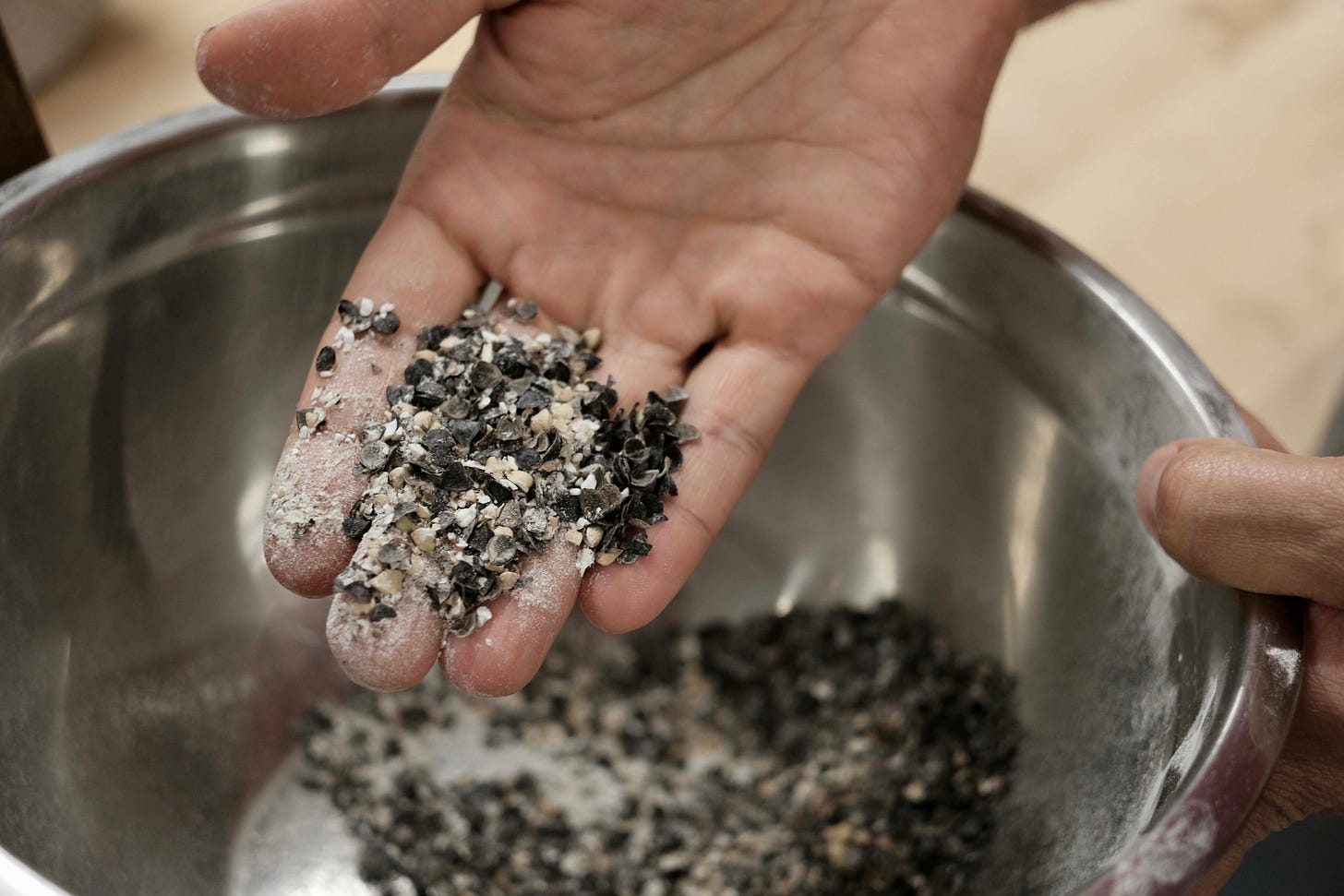As a horticulturist, my focus has predominantly been on vegetable, herb and flower seed. However, it is impossible to talk about food and seed sovereignty without addressing grain. One of the 5 major food groups, grains make up a large percentage of our diets. Wheat, rice, oats, cornmeal, barley and other cereal grains all fall into this category. These are then distinguished into two further categories: whole grains which have the entire grain kernel including bran, germ and endoplasm; and refined grains which have been milled in a way that removes the bran and germ.
The majority of the grains we consume in the UK and US are refined – from your average loaf of sliced white bread to the digestive biscuit you dip into your cup of tea – and this is having accumulative impact on our health, and wider ecosystem health. The refining process removes more than half of wheat’s B vitamins and all its fibre. Studies have shown that the average fibre intake of UK adults is less than half the recommended amount. The consequence of this reduced dietary fibre is a population of people more prone to heart disease, higher cholesterol, stroke, obesity and type 2 diabetes.
But all is not lost. There are amazing organisations, bakers, farmers and millers working towards a healthier and more equitable grain economy. On our road trip around the Skagit Valley, we visited one of the leading bodies carrying out this work: WSU Breadlab.
Breadlab was founded in 2010 by Dr Stephen Jones in response to growing concern over plant breeding practices controlled by the large chemical companies. Stephen moved away from the world of breeding Roundup ready wheats, and started working directly with farmers, actively engaging with those local to the Skagit Valley to ask them what they needed from their grains and what they wanted him to work on as a plant breeder. In a collaborative approach that saw farmers and plant breeders coming together to make things work better for everyone, WSU Breadlab was formed. One of the first varieties released was Skagit 1109, bred specifically for maritime Pacific Northwest climate, for farmers in this very region.
Breadlab are Washington State University researchers working outside of the commodity system, with a goal of introducing the concept of better tasting, healthier, affordable bread. They create and breed wheat, barley and rye varieties that are better for eating, and better for soil and farming practices. Their goal is the change the way the world views and eats wheat.
Stephen had recently retired from his role of Director of Breadlab after many years, so the day we visited we were met by Janine Sanguine, Outreach & Education Manager, and Robin Morgan, former PhD student of Stephen’s and now continuing his work on coloured and perennial wheats. Janine and Robyn gave us a tour of the impressive facility at the WSU campus: from the milling room to the seed store, it was a unique glimpse into what happens behind the scenes in the facility. After our tour, we sat down to eat some delicious freshly baked scones, drink coffee and chat all things grain.
Janine leads the lab’s outreach and engagement projects, spreading the word about the important work carried out there, and educating both adults and children about the benefits of eating whole grains.
‘I loved baking, I grew up on a farm, but I never understood the seed. We took it for granted you find the seeds and you buy them from somewhere. I never gave a second thought to my people’s heritage and where that actual seed came from.’
At WSU Breadlab, the focus is very much on that seed, and on the whole grain system – from plant breeding to trialling varieties in the field to milling and finally to baking. They are not just working with the plants, or working with the end food product, they are doing both, and demonstrating a practical and replicable supply chain. By working collaboratively and considering all stages of the process, a regional grain economy is emerging. There are now local mills, and a local malting facility.
‘The most critical thing is the mill, for us, that’s how we turn it into something that we can bake our bread.’
Janine explained the importance of breeding varieties that can function well as a wholegrain to make it a genuinely viable alternative to the current refined offerings. When selecting varieties, they very much consider the production methods – how to get volume and sliceability in a loaf – and look at the current demand of the industry to see how they can offer a practical alternative.
Robin – ‘Wheat is a staple crop grown all over the world and a lot in the US, it’s a commodity crop that has exploded everywhere, and the main purpose is to produce refined flour. Taking the grain, milling it then removing the bran and germ and just keeping the refined flour and using that. That has been the standard use in the industry. The problem with that is from a nutritional perspective it’s impoverished. The system is so big it doesn’t change on its own. Flour mills offer refined flour, bakers bake with refined flour, people eat white bread. And then the loop continues, they ask wheat breeders to produce varieties that will make refined flour. This process has been going on for a 100 years or so in Europe and North America, despite the fact that we now know that in US more than 90% of people are lacking dietary fibre requirements. At one end we have grains from which we remove the fibre, and then we have people that don’t have access to fibre. So, it’s a major disconnection between the food production side and the public health world.
So here at the lab we develop wheat varieties that can function well as whole grain. Because some of the concern in the baking industry or the flour industry is that if we are using wholegrain, we will lose some of the loaf body, our loaves will be denser if we keep the bran, or the flavour will be bad if we eat the whole grain, or it's not what people want. All of these things are just arbitrary things, somebody said that’s what we want but the reality of it is through selection and through breeding we can address all of those things. We regularly bake bread with whole grain wheat and don’t make bricks! They’re desirable breads, delicious. That’s one of the main reasons we do this work.’
Another important reason is the impact it is having on our farmland and wider ecosystems. In the UK, grain and cereals account for around 71% of the arable crops, and a large percentage of these are grown in conventional, chemical-based systems and often as monocultures. That’s 4.4 million hectares of agricultural land being farmed in a way that is potentially contributing towards soil degradation, biodiversity collapse and pollution of our waterways. This is not the farmer’s fault. This is arguably the result of an industrialised food system that places unachievable demands on the farmer, without adequate compensation or respect for their work, human health or the wider ecosystem. The grains like those being developed at WSU Breadlab offer diversity to this otherwise homogenous landscape – their breeding process focuses on resilience, adaptability and nutritional integrity, these plants are being bred for resilient regenerative systems that do not rely heavily on chemicals to produce a yield.
Beyond the plant breeding, Breadlab are creating a bread product that is approachable, accessible and affordable. They are also building community around that bread and working to push boundaries and change habits. Breadlab don’t simply offer the grain and the seed, they offer the food, the stories and new traditions centred around growing, processing and cooking practices. They share a building with the King Arthur Baking School, and regularly host baking workshops and culinary classes for the local community.
Janine - ‘We’re trying to provide an alternative pathway so people know they don’t just have to eat what’s given to them’
The work of the Breadlab team is far reaching. They work with many farms across Washington State and beyond, one of the more local collaborators is Chimacum Valley Grainery. Not far from Port Townsend, we headed out to Chimacum Valley Grainery (CVG) for a tour and to see some of WSU Breadlab’s varieties in action. CVG is an 80 acre farm organic farm in the fertile valley soils along Chimacum Creek. Crystie and Keith Kisler took on this land in 2004. A fifth generation farmer from Eastern Washington, Keith is carrying on his family’s grain growing tradition and together with Crystie they are bringing a reverence to the land and acknowledging the complexities of our current time. As well as being a productive family farm, they also house a stone mill, wood fired bakery and craft microbrewery. CVG are deeply committed to providing locally produced nourishing food to their community. As Crystie explained, they work at a very localised scale, growing most of their grains on site, sometimes sourcing from other like-minded organic and regenerative growers in the region. Their mission is to grow food for local people, and they currently produce a vast diversity of grains, including some of the heritage and more modern varieties bred by WSU Breadlab - all selected for flavour and nutrition and ability to thrive in Western Washington’s maritime climate.
As well as stable varieties, they grow blends or populations, such as the Climate Blend wheat: a mix of 4 varieties for a diverse mix of genetics with resilience and a rainbow of nutrition. They mill all these grains on site in their stone mill, and the flour is then used in their bakery or sold to the local community. As well as bread, they also produce grains for pasta making, and have diversified into brewing, with a floor malting facility and on-site microbrewery. With soil health and human health at their heart, Chimacum Valley Grainery was an incredible example of how producing nourishing food at a localised scale is possible, their success strengthened through collaboration with organisations such as WSU Breadlab. Together they are demonstrating the possibilities that come when we restore continuity between the landscape, community and sustenance.
In creating these alternative grain economies, Breadlab and farms like Chimacum Valley Grainery are aspiring to a more abundant and thriving human and natural landscape. And this is happening back home too. Inspired by WSU Breadlab, UK Grainlab is doing vital work to create a more diverse UK grain based economy: building a resilient, nourishing and equitable food system with shorter, healthier and more diverse supply chains. They host events several times a year that bring farmers, millers, bakers, plant breeders bakers, cooks, scientists and academics together to learn from each other. Very much like Lane’s work with the Culinary Breeding Network, they are bridging the gap between all the stakeholders in this community. And there are now collectives springing up across the British Isles offering an alternative human scale non commodity pathway for grain. Having most recently lived in the Southwest, I got to participate first-hand in the regular Southwest Grain Network meetings and witness the power that arises when communities come together to make change happen.
As well as short supply chains, there are also organisations such as Wildfarmed working at a nationwide level. At the recent Groundswell festival in the UK, Andy Cato, one of Wildfarmed’s founding members, spoke about their endeavour to meet the world where it currently is. Wildfarmed recently surveyed UK consumers, and results indicate that 76% of people don’t eat sourdough bread. At a nationwide scale, they are looking for progress over perfection, and although in an ideal world they would like to see everyone eating complex wholegrain diverse products, right now they are working within complexities of the current supply chain to bring consumers closer to their food supply and the revolutionary farmers that enable that grain to reach their tables in a more ethical way. Making change happen one loaf at a time.
Although within a different framework, both these organisations, like WSU Breadlab, appear to be working towards a similar goal: of tending the land, of nourishing ourselves and building community. There’s strength in diversity, and it’s inspiring to witness all of these amazing folk working in their own unique ways to achieve real positive change.
In the words of Bonnetta during our visit to Breadlab: ‘We need to find ways of bringing people together around the common good, and what’s better than bread?’

